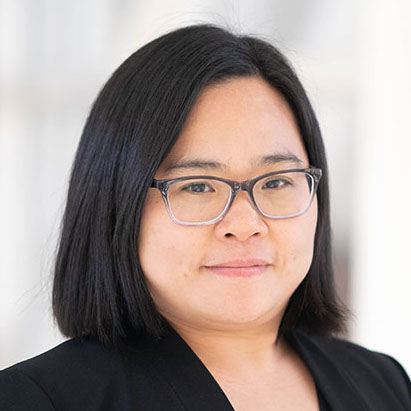Specializing In:
- Targeted therapy and immunotherapy
- Anti-tumor immunity
- Myeloid cells
- Epigenetics
- Ovarian cancer
- Prostate cancer
Research Interests:
- Interactions between cancer and immune cells
- Epigenetic control of suppressive myeloid cells
- DNA damage response
- Cyclin E1
- High-grade serous ovarian cancer
- Castration-resistant prostate cancer
Biography
I am an Assistant Professor of Oncology in the Department of Immunology at Roswell Park Comprehensive Cancer Center. Following my Ph.D. completion, I received postdoctoral training at Mayo Clinic, focusing on epigenetic regulation in prostate cancer initiation and progression.
I continued my research at Dana-Farber Cancer Institute and Harvard Medical School, where I characterized a STING-dependent anti-tumor immune response induced by PARP inhibition in ovarian cancer. Recently, I identified a new mechanism of acquired resistance to PARP inhibition in ovarian cancer and explored therapeutic strategies to overcome this resistance.
My current research centers on deciphering the oncogenic signaling pathways in ovarian and prostate tumor cells, their modulatory effect on the tumor immune microenvironment, and the development of mechanism-based innovative targeted therapies and immunotherapies for cancer treatment.
Positions
Roswell Park Comprehensive Cancer Center
- Assistant Professor of Oncology
- Department of Immunology
Jacobs School of Medicine and Biomedical Sciences, State University of New York at Buffalo
- Assistant Professor of Oncology
Background
Education and Training
- 2011 - PhD - Genetics, Fudan University, Shanghai, China
Fellowship
- Postdoctoral Fellowship, Department of Biochemistry and Molecular Biology, Mayo Clinic, Rochester, MN
- Postdoctoral Fellowship, Department of Cancer Biology, Dana-Farber Cancer Institute, Boston, MA
Professional Memberships
- 2012-current - American Association for Cancer Research (AACR)
- 2019-current - Society for Immunotherapy of Cancer (SITC)
Professional Experience
- 2020-2023 - Instructor, Department of Cancer Biology, Dana-Farber Cancer Institute; Department of Medicine, Harvard Medical School
Honors & Awards
- 2024 - MERIT Award (R37), National Institutes of Health
- 2021 - Early Career Investigator Grant, Ovarian Cancer Research Alliance Research Award
- 2017 - Friends of Dana-Farber Cancer Institute Research Award
Research Overview
Publications
1. Ding L#, Wang Q, Martincuks A, Kearns MJ, Jiang T, Lin Z, Cheng X, Qian C, Xie S, Kim HJ, Launonen IM, Färkkilä A, Roberts TM, Freeman JF, Liu JF, Konstantinopoulos PA, Matulonis UA, Yu H, Zhao JJ#. STING agonism overcomes STAT3-mediated immunosuppression and adaptive resistance to PARP inhibition in ovarian cancer. J Immunother Cancer. 2023 Jan;11(1): e005627. #: corresponding author.
2. Wang Q, Bergholz JS, Ding L, Lin Z, Kabraji SK, Hughes ME, He X, Xie S, Jiang T, Wang W, Zoeller JJ, Kim HJ, Roberts TM, Konstantinopoulos PA, Matulonis UA, Dillon DA, Winer EP, Lin NU, Zhao JJ. STING Agonism Reprograms Tumor-associated Macrophages and Overcomes Resistance to PARP inhibition in BRCA1-deficient Models of Breast Cancer. Nat Commun. 13, 3022 (2022).
3. Zhao Y*, Ding L*, Wang D, Ye Z, He Y, Ma L, Zhu R, Pan Y, Wu Q, Pang K, Hou X, Weroha SJ, Han C, Coleman R, Coleman I, Karnes RJ, Zhang J, Nelson PS, Wang L, Huang H. EZH2 cooperates with gain-of-function p53 mutants to promote cancer growth and metastasis. EMBO J. 2019 Mar 1; 38(5): :e99599.
4. Ding L*, Kim HJ*, Wang Q*, Kearns M, Jiang T, Ohlson CE, Li BB, Xie S, Liu JF, Stover EH, Howitt BE, Bronson RT, Lazo S, Roberts TM, Freeman GJ, Konstantinopoulos PA, Matulonis UA, Zhao JJ. PARP Inhibition Elicits STING-Dependent Antitumor Immunity in Brca1-Deficient Ovarian Cancer. Cell Rep. 2018 Dec 11;25(11):2972-2980.
5. Ding L, Chen S, Liu P, Pan Y, Zhong J, Regan KM, Wang L, Yu C, Rizzardi A, Cheng L, Zhang J, Schmechel SC, Cheville JC, Van Deursen J, Tindall DJ, Huang H. CBP loss cooperates with PTEN haploinsufficiency to drive prostate cancer: implications for epigenetic therapy. Cancer Res. 2014 Apr 1; 74(7): 2050-61.
